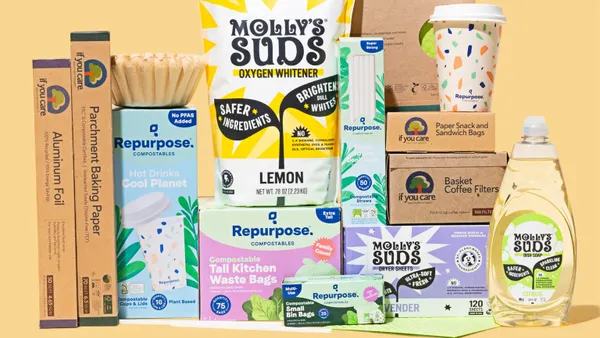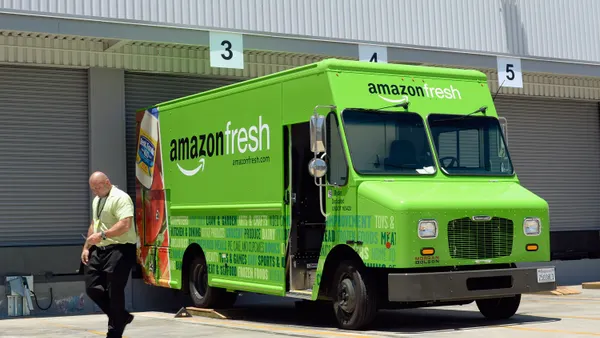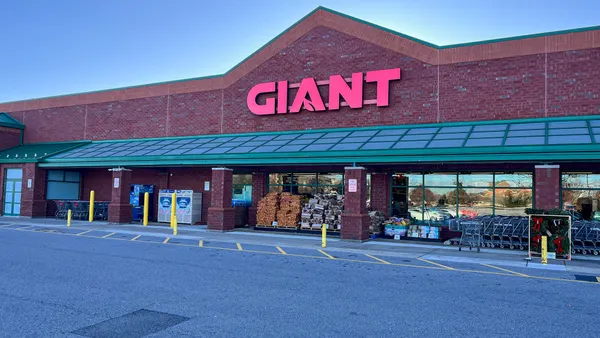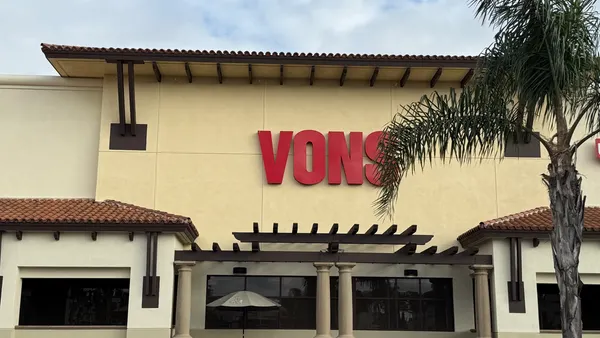Beauty and personal care products have never been grocers' forte. As sales accelerate across retail channels and new lines from celebrities like Lady Gaga draw considerable buzz, though, some players are taking another look.
Albertsons, Whole Foods, Wegmans and Trader Joe’s have expanded their stock and experimented with new lines recently. Private label also offers an opportunity to build out sales with loyal customers, particularly in all-natural beauty and skincare.
But with so many strong competitors, including online sellers, analysts agree that grocers need to step outside the box and offer shoppers something extra.
Hana Ben-Shabat, a management consultant and advisor to beauty brands, told Grocery Dive she believes that the only way for grocers to succeed is to carefully analyze their customers and determine if their company has the credibility to offer high-margin beauty and personal care products. Whole Foods, she said, is well known for selling organic, natural and health-related products, so it was a natural progression for the grocer to also sell natural and organic beauty and skincare.
"Whatever products you choose to sell needs to be in line with your overall positioning," Ben-Shabat said. "You can't bring very expensive products to customers who are looking for lower prices."
Grocers have an advantage over other retailers in that they have the high traffic and repeat visitors who will notice new offerings and respond to promotions, said Ben-Shabat. Merchandising promising items in center store aisles or on endcaps can generate incremental sales and communicate a retailer's commitment to beauty and personal care.
Ben-Shabat noted Whole Foods' health and beauty care aisle is wider than its grocery aisles — a strategy that promotes browsing and is aesthetically pleasing, she said. The grocer also offers promotional discounts like its recent Better Beauty Swap, which let a limited number of customers bring in their empty beauty and body care products in exchange for a bag full of clean beauty products. Whole Foods also displays tester products and disposable application tools to allow customers to try products on their own before purchasing.
Jason Maehara, manager in the consumer and retail practice at A.T. Kearney, noted that retailers often take a piecemeal approach to health and beauty care and fail to form a cohesive offering. Grocers, he said, need to determine a beauty and personal care strategy and make sure it gels with their overall grocery positioning.
"The real trick is to see (health, beauty and wellness) categories through the eyes of the shopper and integrate your offerings as much as possible into a single, easy-to-access customizable shopping experience – in-store and online," Maehara told Grocery Dive in an email.
Citing Nielsen data, Maehara noted that health and beauty care sales at food, drug and mass stores grew 1.5% in 2018 while general merchandize overall declined 1.6%.
Exploring new opportunities
A new report from performance marketing agency Merkle suggests that the trend toward experiential marketing that has paid off for retailers like Ulta Beauty and Sephora is now expanding into other channels. CVS’s partnership with Glamsquad, for example, allows customers to try different products before purchasing with the help of a Glamsquad member. H-E-B and ShopRite also have beauty advisors on hand to work with customers.
"If you just have another aisle and don’t try to differentiate or offer something extra, it won't work." Ben-Shabat said. "Some stores will have experts who would really understand the products. And those people can help customers."
Private label has been an area of focus for grocers, and this often includes skincare selections. Indeed, products like face wash, moisturizing cream and sunscreen have a high level of loyalty, Ben-Shabat noted. When consumers find a product that works well for them, they'll often stick with it and are willing to make a special trip.
"If you just have another aisle and don’t try to differentiate or offer something extra, it won't work."

Hana Ben-Shabat
Beauty brand management consultant and advisor
Wegmans rolled out an organic skincare line in 2015 and has been gradually expanding its selection of skincare products to include face wipes, face wash, body soap and more. The company has a health and beauty care section along with endcaps placed at the front of its stores to showcase all of its featured brands along with signage to broadcast sales.
Many retailers outside of the top players stop short of offering private label beauty products. But that could be changing. Last month, Dollar General rolled out a new 140-SKU beauty line called Believe Beauty at 15,400 stores. The line includes foundation, lip and eye products priced at $5 or less, and has gotten heavy promotion on Dollar General's Instagram account.
Beginning in March, Albertsons tested "Beauty in a Blink" boxes in select Jewel-Osco stores that included nine new and indie products like Hello's cruelty-free toothpaste and Bausch + Lomb's Lumify eye drops, as well as more mainstream items including Simple, Dove, Maybelline and Loreal's Revitalift. The boxes retailed for $7. The retailer told Grocery Dive it was on a trial run and the boxes were never replenished.
Trader Joe’s, meanwhile, just launched new skincare products focused on clean ingredients. Its Ultra Gel Hydrating Moisturizer, which retails for $9, has been compared to popular high-end cream La Mer, which retails for $175.
For grocers that do want to dabble in private label beauty, Ben-Shabat recommends starting in makeup or color cosmetics, which see low loyalty and a high level of customer trial. They should also consider focusing on clean beauty, which is the top trend in the industry, she said.
E-commerce gives retailers more freedom to experiment
Bringing new beauty and personal care products into stores can be tricky, and may require swapping out core grocery items. But Jacquelyn Cooley, market research analyst with 1010data, said e-commerce opens up grocers' ability to experiment.
"With the 'endless aisle' grocers don’t have to worry about limited shelf space and can offer a wide range of products," she said. "They can tap into the luxury/high-end space online as the reward very much outweighs risk."
Cooley noted that enticing consumers to expand their basket size while shopping for beauty and personal care items is key to success in e-grocery. For example, in the beauty/hair care category last year, grocery saw 7.5% of sales online, up from the 4% they held in 2017, 1010data found.
Some online-only grocers like Thrive Market and Brandless have tapped into this market with sales of makeup wipes, cleansers, lotions and face creams. Most brick-and-mortar chains have an e-commerce platform, and a few like Albertsons and Kroger have built separate direct-to-consumer marketplaces.
Looming over online sales, of course, is Amazon, which has been doubling down on health and beauty products. According to eMarketer, Amazon health, personal care and beauty reached $16 billion in 2018, a 38% increase from 2017. The online retailer recently kicked off its new exclusive makeup line with Lady Gaga timed to Prime Day. It also has its own free-from private label skincare Belei and most recently launched a beauty store for professionals.











